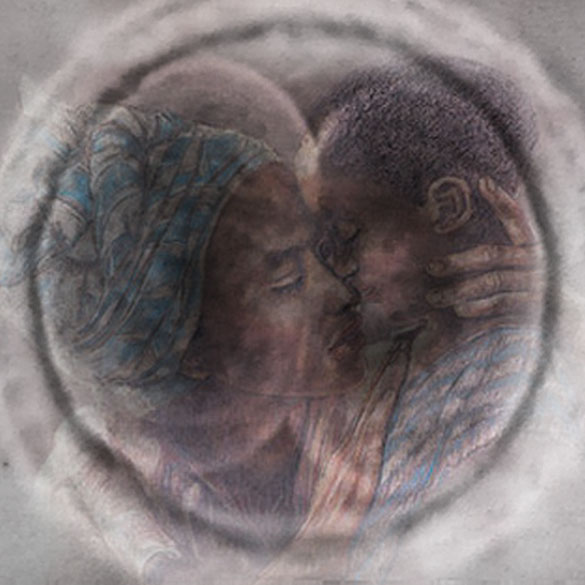“I am Young and ye are very Old wherefore I was afraid”
–Job 32:6
Slouched in the doorframe:
foliage of hair all unwound
and curious, the lips insufferable,
hands two dumb animals—you’re anxious—
Excuse me. You stand on all I can
give: the undrawn line between there
and here. The grotesque cluster
of numbers invading the space between
two and one. Negatives. Accept
these gifts. Easier when we were together
in one body, better when my hands
settled over your shrouded head like stars.
You were almost visible then and bald
like a little old man. Eventually the satin
dome of my stomach stretched and broke;
tufts of hair sprang from the lunar fabric of
your skull. Oh god, I admit it,
I’m scared. How defiant your hair!
How defiant the fingers, bouquet of teeth,
finite kneecaps, chin and elbows,
defiant your neck, man’s neck. Man,
every moment you’re getting more and more born.
I can’t quite stand it. But there you are,
endless torrent of your figure hunched
skinny at the space between entrance
and exit—vulnerable, flagrant—
Accept these gifts, impossible gifts.
I ask you now only for time,
and time, and time. Blunt solstice
of bodies, two, defiant,
impossible: untangle yourself
from the constellation of my bones.
Music Lessons
Listen.
I know you have stood naked and
proud as children in the hallway of endless gawking men. Belipsticked. Derobed.
Named shameless. You have gnawed all anxious
at the ten lonely knobs of your knuckles in the wings of night’s unknowable stage: muted, then commanded:
Perform. Sing.
Oh, you. I know you.
I know this isn’t easy. Listen,
it’ll happen: A boy will pluck you like something ripe from the insistent crowd. Trust me: his fingers
are brilliant. He will sit
cross-legged and unmoving on your chest. He will be earth-heavy. Do not pretend he doesn’t hurt.
Do not be scared.
This is how men do when they are lonely and embarrassed.
He will refuse to move. Move him first. Grab
tight the handles of his bowed shoulders, drag
the pit of his chest to your head, crack
open the
hot shell of his throat—this won’t be easy—isn’t
—yes—do it—open your ears like a prayer, oh, listen.
This is the second coming of something good.
There’s a rain behind the sternum,
a fat drumming jailed by ribcage. This is his heartbeat.
It is a song
he will teach you if you touch him, all soft. Listen. Try it. Tell me I’m wrong.
Still Life: Breakfast With Grandmother
Her hands are dried fruit on the table
before the old woman’s altar of Sunday’s paper.
She tells me—mouth a pressed flower,
throat laced with underwater
veins, straining, she tells me
that I wear this dress the way it’s supposed
to be worn. This is because I am thin.
She hasn’t worn a dress since
her sixty-third birthday, a night she
begged for wine and fell asleep empty.
Her body’s full of water now, swollen
and leather-coated. She is heavy;
she is full of too much.
Does she beg for death like wine?
Does she beg for death like wine,
my god—this is only breakfast. Death’s
a heavy word. Newspaper, eggs, toast,
paper napkins—the old peaches in the bowl
between us are terrifying.
I suppose there’s a point when it gets easy, the dying:
cool and simple as undressing, untying,
unlacing all that superfluous skin and shining
like the gentle blue surface of morning.
No shame in pouring
into heaven, where everything fits. Dorothy,
I am your girl-woman, woven
of the hair, the cotton, the space between
your daughter’s humble breasts.
I am girl-woman; I am beanpole-thin.
Like a bullet I wear this dress.
Germinal:
(after Michelle Knight)
If she cannot have this baby you also will die.
The mottled hands give no rope–
untied, tense menagerie of fist & fingers
unraveling before gateway of thighs, thighs:
If she cannot have this baby you also will die
This is instinctual, count your curses like
gifts. Remember: cup first the soft head, then neck,
drum of stomach. Unbury the mouth, father’s eyes:
If she cannot have this baby you also will die
No throat deep as youth. You would know.
Ten years ago braces, apples, your birthstone,
archipelago of life. He giveth, he taketh—too familiar,
the aortal cries: if she cannot
have this baby you also will die
No small price for this, the new life—muted
ligature, upper lip, miniscule & precise. Small body
chained to smaller body. Even now, cut these ties.
If she cannot have this—
**
I need not mention womb, contusions,
a silent house in Ohio. Forget captive.
Midwife? Never.
Remember, you escaped with a silence even
the sky cannot tie down— alive & fullgrown &
chained to nothing.
—
Rebecca Beauchamp is a fan of Rilke, cats in cowboy outfits, and top-40 radio hits. Influences include Dickinson, Baudelaire, and Bidart, but mostly her Australian shepherd, Hurley. She’s an undergraduate studying Creative Writing at the University of Virginia but neophyte, she is not: she won a statewide poetry contest in the second grade for (what she believes to be) her magnum opus, ‘The Cat’ (a memorable line being ‘The cat, the cat, quiet as can go/ I know he knows something that you don’t know.’) and ever since then she’s been writing nonstop. In D.C. she came into her own as a spoken word poet, performing at numerous venues in the Metro/DC area. Our poet began her collegiate journey at Virginia Tech, where her work was selected for the school’s literary festival, undergraduate research conference, and won the English department’s annual prize in poetry. Has she been published in The oh-so-estimable New Yorker? Has she been in the running for the Nobel Prize in Literature? Well, no. Not yet. She does, however, know how to whistle every recorded Led Zeppelin guitar solo and makes a mean blueberry pie.


